Life at the Lake
a diary of living at a small lowland lakeWHAT IT'S LIKE
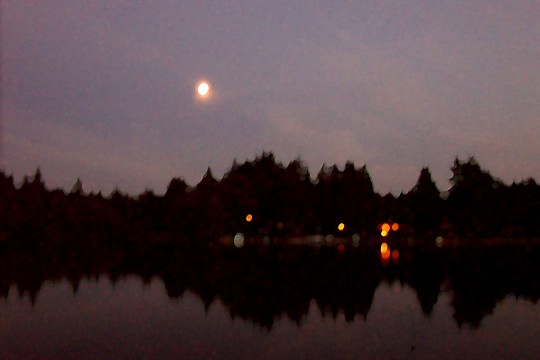
Early moonrise over Lake Ketchum
|
Archive Search |
| Links |
|
and s-integrator |
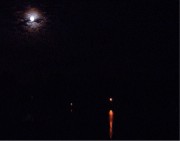
The nearly full moon seen a bit later than the previous night
Digital photography is a lot of fun, and you can see your results moments later. Windows XP makes working with images much easier and stores your photos in a folder called My Pictures, from which they can be copied and pasted into files and applications in an instant.
File sizes stored in .jpg mode can be reduced for practical purposes, such as attaching in email and pasting into programs such as MS Front Page. The above image has been shrunk to 180 by 140 pixels, which is pretty small but sharp if not "blown up" very much.
The above picture was taken, processed, edited, and utilized in Front Page in less than five minutes. Neat, eh?
Trickier yet is keeping the camera steady under low light conditions and with the subject at infinity. (The moon, if anything else, is seen at near infinity.) Yet with no shutter to smash across the camera, as is the case with 35mm. cameras using film, there is less "kick" or camera shake, and low speed shutter settings can produce sharp images.
And light reflections from peoples' docks are prettily captured. Note the scudding clouds passing across the face of the moon.
- - Comments ()
...

Did you see the moon last night? Not yet full, it rose early
The morning paper says that our government is spending $3.9 billion per month on the military occupation of Iraq. And the cost has been so for six months or so.
But relax. Congress is looking into the matter. The Democrats, that is. And we can always depend on Congress to watchdog spending on the part of the Executive Branch. (Never themselves.)
Just think what America could do with all that wasted money if it were diverted to the internal needs of the country—infrastructure of the cities, mass transit, health care for the populace, food and shelter for the homeless and the hungry.
It will never happen, Boobie. There are powerful forced at work to prevent that from ever happening. Instead, the rich get richer as upper-echelon taxes get lowered, corporate director salaries roll up and on, dividends are not much taxed, and medical and dental costs to patients continue to increase about ten percent per year. And interest rates on savings are less than one percent.
- - Comments ()
...
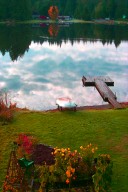
Lake from my wife's garden
Hot sunny day. Doug Dorling from Applied Aquatics is coming today to treat our lake with Sonar, a herbicide that will kill within two weeks most shoreline plants. It is an awful necessity. Without such annual treatments the lake will be covered, bank to bank, with duckweed. It will resemble a meadow.
In the not-so-long ago past, when we did not "treat" the lake with chemicals, and it was allowed to behave naturally during the course of an intensive three-year study, the lake did take on such a look. And there is the story, perhaps apocryphal, that a visitor during a summer afternoon party at Jack Brondello's spread, not his firest drink in his hand, decided to walk off the dock and onto the attractive meadow.
Of course he sank into six feet of water.
It may not be true, only one of those stories that maintains itself over the years, but it will serve (again) to indicate what we face each summer.
So Dorling will arrive in an hour or so and launch his motor boat. First he posts notices on each dock. He will then proceed to circle the shore and spread a chemical that costs, I've heard, $1750 a gallon, discreetly on top of the water. Quickly the deadly stuff will begin to do its work.
Unfortunately the stuff is not selective. It will kill the duckweed and unwanted underwater plants, such as elodea, but it will also kill grasses, pondweeds, yellow lily pads, and turn the bases of the cattails an unattractive yellow, but they will survive it.
It will not touch the algae in the water column, nor the algal scum on the surface that is increasing rapidly in this warm weather. This morning rafts of it drifted down the center of the lake in thick clots, looking much like the luscious stuff you find in French onion soup. Not so luscious, we will have to attack it with garden rakes when it lines up along our shoreline.
It is hard work, raking is, but it works, and is organic and natural to perform. When sun dried on the beach, algal scum makes an excellent mulch and fertilizer.
I will tell myself this as I rake and curse.
Water temperature in excess of 22 degrees C. The trout have for all practical purposes quit hitting. I still catch an occasional one, and release it, just to see if I can do it. But it is poor fishing now, and the trout have grown accustomed to bottom feeding on the abundance of crustaceans they find there.
- - Comments ()
...

This is the season of copious fruit.
Yesterday I bitched about the flock of domestic ducks eating our strawberries, and wanted to kill them, the ducks. Ah, but today, today the world is much more mellow. For one thing, the sun is shining. And we have thrown a fine mesh net over the strawberry bed. It is the same one we use for protecting the blueberries (still ripening) from the birds.
My wife says it may not work; the ducks may press it down and push their sharp little beaks deep down into the plants and find the berries, all the same. But it is something to try. The problem of the foraging ducks remains.
So much fresh fruit is available, you'd think I'd be willing to share, wouldn't you? What with raspberries at their peak, the ever-bearing strawberries in mid-season hiatus, huckleberries on the horizon, and green grapes and peaches from local fields now in the stores, there is an abundances of fresh fruit, more than any of us can eat through sustained daily effort.
And then the discovery last night of a patch of wild blackberries just coming on, in among the bloomed-out rhododendrons and azaleas. They form a thick, luxurious multi-clustered bunch. My wife pointed them out to me proudly and said it is my responsibility to pick them as they come on.
Great!
At first I thought they were more of the ubiquitous Himalayan blackberries, a scourge. But, no, they are the preferred smaller kind that grow blood-black ripe , are small seeded, and need no sugar to make them palatable.
These I shall eat on my vanilla ice cream for dessert for as many days as they will last, and watch delightedly as the white ice cream "bleeds" with their sweet, subtle flavor.
- - Comments ()
...

This one times six, and always hungry
There are six of these guys cruising around the lake, eating everything in sight, crapping everywhere. Originally there were seven, but reportedly one was murdered by a teenaged boy.
I was incensed at the news, but now I'd like to find and reward him. For these ducks are now eating my choice strawberries. Not a one is left for the next picking.
We spotted them this morning, feasting away, and my wife and I went literally flying at them. They barely moved away, for they are not at all threatened by humans. (Now my Labs, if they were awake and unpenned, would charge them and send them flapping to deeper water.) I threw my tennis racket at them, missed, saw it bounce on its springy hoop, and disappear into three feet of water. Later I will don waders and retrieve it with some sort of yard tool.
These "cute" ducks have to go. My neighbor suggested shooting them, but we have a regulation that no gun may be fired within 500 feet of the lake. Good rule, it brings up thoughts of pellet guns from my ancient boyhood. As I recall, you can pump them up with compressed air till you achieve just the right amount of pressure to maim or kill, depending on your need. But then the steel pellet might ricochet. . . . An innocent neighbor might get hurt.
In the meanwhile (perhaps a long one) we will put a net over the strawberries, as we have in the past to protect them from the birds, and hope that a duck avoids the net and doesn't get entangled.
"Beware of entangling alliances," particularly if you are a duck. Good public policy.
- - Comments ()
...
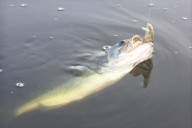
What our bass fry may grow into, given a few years and much good luck
Ah, no more crackle of firecrackers and cherry bombs and rockets gone astray. Peace reigns, however briefly. It is why we live on a small lowland lake.
This year's bass fry are 4-5 cm. long; there seem to be two main crops of them, and they are about 2 cm. difference in length. Both are voracious feeders and travel around in schools of many. When the sunlight hits the shallows, they seek the warmth and brightness.
At this stage I suspect they are transitioning their diet from phytoplankton to zoo-, that is, the tiny animal form of such abundant food. And small insects will become part of their diet. Not yet, but soon, I will be able to make out their peculiar bass marking on their flanks—the dark vertical bars, the silvery overall sheen, the line that runs along their lateral flank.
If I fish bait from off my dock, I can mentally picture the tiny bass coming up to the bait to nibble on it, many of them, each taking a minute bite in a kind of micro-version of a feeding frenzy, until the bait is gone, and I reel in, thinking a trout has taken it and I've missed the strike. And when I get a trout firmly hooked, such as the first one in several days yesterday, I suspect the trout has swept in and stolen the bait from the bass that have arranged themselves like feeders at a trough.
The trout was less than 12 inches long, but was welcomed heartily and seen as a sign that—with water temperatures just below the surface at 22.5 degrees C. (that is about 73 degrees F.)—the trout are still lazily feeding on the bottom, where they can find in abundance their staple, snails.
- - Comments ()
...
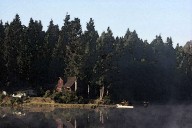
All Quiet on the Western Lake Front
Anyone who has not shot off his last firework by 12:01 AM of July 5 will immediately be forced to ingest what's left or be hoist by his own petard. I will apply the match to the punk.
Night of July 5th saw a repeat of the crackers and bombs of the previous night pushed over to the morning of the 6th. This is what happens when you live in the country (lake or no lake) and there is no (effective) law enforcement. In fact, it is a joke to call the county sheriff over much of anything. He never comes. (Pity his wife.)
What we do is call 911. (I am not so fatuous as to dial them up over something so innocuous as prolonged fireworks.) My rental neighbor to the East suffered an attempted break-in on the night of the 4th. What a perfect time to try one, what with all the noise going on!
So the poor guy—who was not at home then, or hardly ever—told us about it the next day, when he had returned from work, or wherever it is he goes, all night long, and was properly angry and indignant. After all, a break-in is a personal and physical assault, albeit done by a cowardly unknown person. And one's reaction is of personal violation.
So he called the sheriff, which here is 911, and the phone receptionist asked if the forced entry was successful, and it was not, and asked if anything was taken, which it was not, and filed a report, I guess, for no sheriff came. And had he been around here longer, my neighbor probably wouldn't have bothered to phone the sheriff.
He has become a statistic, which will soon be used to request greater funding through personal property taxes. There is a little irony here, folks, but don't ask me to put my finger on it.
This is the lawless West still. And people who live in cities tell me it is much the same there. Police gather statistics, but rarely show up to offer assistance, unless someone is murdered. That is where all the fun and excitement is. TV cameras and reporters will be waiting. And the same night you may get to see yourself on TV, if the crime is messy enough.
The above remarks provoked, of course, but a continuation beyond reasonable expectation of the community's July Fourth celebration. It must be much the same,nationwide.
- - Comments ()
...